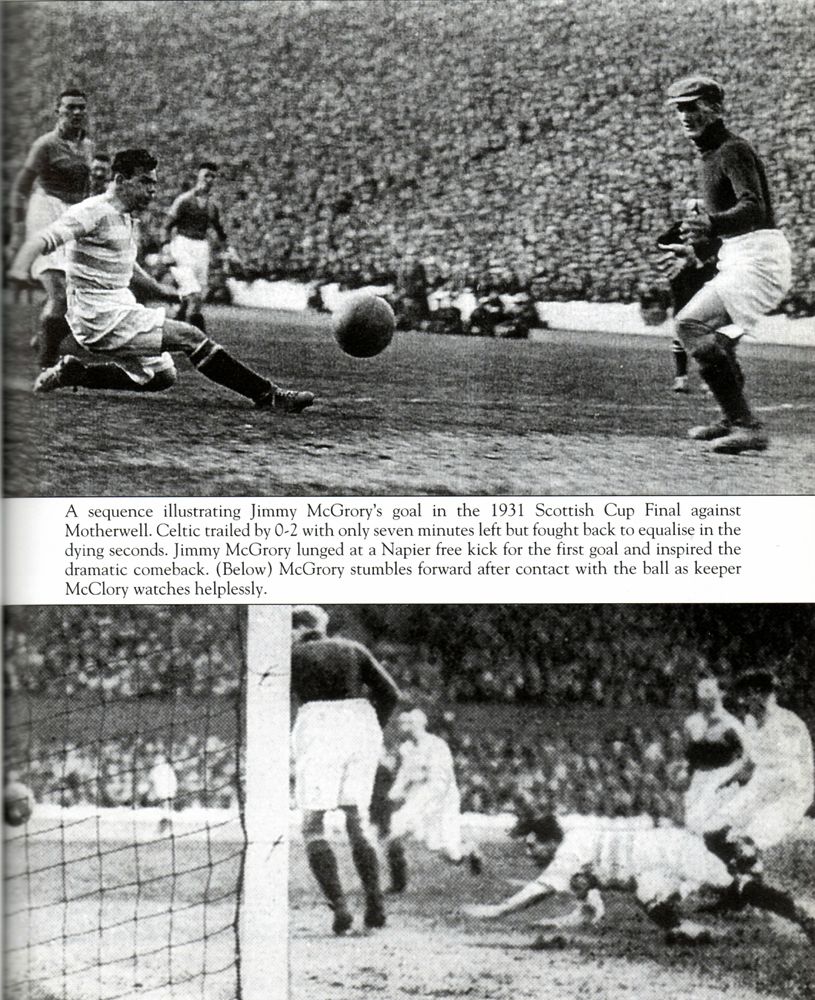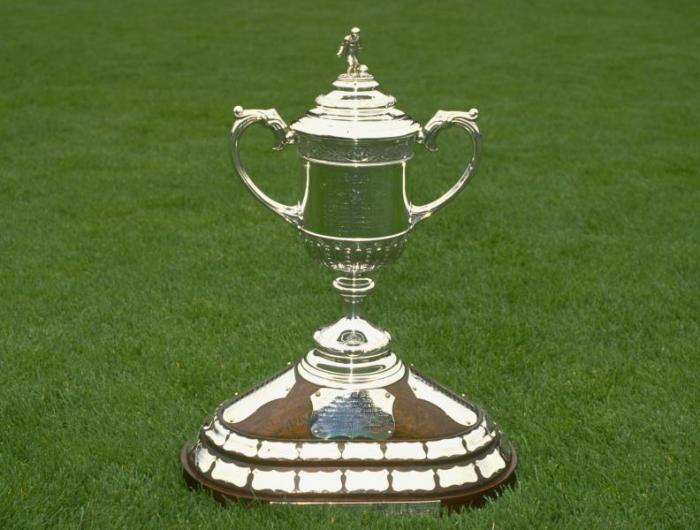The Celtic v Motherwell Scottish Cup Final in 1931 was perhaps the most remarkable final in the competition’s history.
The play was dull, the weather was sultry and the atmosphere had gone. Celtic fans in the North and East terracings looked on disconsolately, their battling cries strangely silent, their banners which had been so much in evidence before the start now drooping limply.
A glance now and again at the huge clock on the South Stand, so much a feature of the old Hampden, revealed the minute hand heading inexorably towards the perpendicular of 4.30, and everyone knew that the game would finish at 4.40. A fan in the South Stand would later claim (improbably) that he heard it ticking even though over 100,000 people were there.
The west terracing was awash with the colours of Motherwell. There were female cheerleaders and someone holding up the letters M O T etc. as “Give us an M, Give us an O, give us a T…and what have we got – Motherwell”.
There were also a few Union Jacks and blue colours as well, indicating that they had drawn support from other quarters. But they had cause to be happy.
The clock was now on the perpendicular and their team were 2-0 up – two lucky deflections, but they were on top, as Celtic’s efforts became ever more desperate, their claims for penalties ever more absurd and even now a few of the weaker elements of the Celtic brethren were seen to be heading home.
Willie Maley was glum and pessimistic.
His opposite number John “Sailor” Hunter was beginning to be optimistic. As a player 21 years ago, he had won a medal with Dundee. It would be nice to win one as a manager.
Celtic had won the trophy 12 times, Motherwell had never even been in a Final before.
It was still not over yet, though. Peter Wilson and Alec Thomson were more and more winning the midfield battle but could not yet turn their advantage to goals. The hand had now passed the perpendicular and was heading upwards when Celtic were awarded a free kick near the edge of the box.
Charlie Napier took it and the ever eager McGrory got a boot on to it. Celtic had pulled one back, but there was no time for celebrations and McGrory shrugged off the congratulations as he ran up the field pointing at the clock.
The next ten minutes saw a revivified Celtic crowd and piles of hysterical pressure on that King’s Park goal, but the clock kept ticking and the Motherwell Hollywood razzamatz cheerleaders became more and more noisy.
Some of the Celtic Directors were beaming their congratulations to their Motherwell counterparts, back home in Motherwell the evening paper was being prepared with the headline “Well’s Cup At Last”, and Peter Craigmyle the referee, enjoying being the centre of attention, looked at his watch, then the clock, then in an extravagant gesture his watch again before putting it back in his pocket and continuing that last few seconds of the game.
Celtic had the ball on the right. It was Bertie Thomson, the dissolute prodigal, the street-corner boy who had the ball. Well policed and with no-one obvious to pass the ball to for all his mates had piled into the penalty box, he sent over a high ball on a wing and a prayer, hoping that somehow the golden head of McGrory would get there. But the ball was covered by centre-half Alan Craig – or so he thought. Possibly distracted by the sun, possibly aware of a charge by McGrory, possibly upset by the “Go For it, Alan” cry of a team mate, he rose for the ball, but didn’t meet it cleanly and the ball skimmed off his head past his distraught goalkeeper!
There was a moment’s silence before everyone took in the enormity of what had happened.
McGrory’s peal of delight was heard in the stand, the other Celtic players cavorted with joy and ran to greet Bertie Thomson, the terracings erupted in tsunamis of emotion – and poor Alan Craig lay on the ground, thumping it again and again.

The ever gentlemanly McGrory and referee Peter Craigmyle helped him to his feet, for the game was now over, the clock said quarter to five, and the replay was scheduled for Wednesday night.
That night it was as if Celtic had already won the Cup.
They would of course do so on the Wednesday (4-2), but Glasgow turned green and white that night. It was the relief of Mafekin and Armistice Day all turned into one, and the supporters, most of whom suffering badly in the Depression, would never be the same again.
Garngad, the Gorbals, Croy, Holytown, Cleland all saw dancing in the streets, a phenomenon also evidenced in the Celtic pockets of Edinbugh and Dundee, namely Leith and Lochee. It was a resurrection, and seldom have Celtic ever played in such a dramatic game.
Watch the highlights below.
David Potter
WRITE FOR THE CELTIC STAR
Do you fancy writing for The Celtic Star on any Celtic related subject of your choice? If so please send your contributions to editor@thecelticstar.co.uk and we’ll get it onto the site for you.




